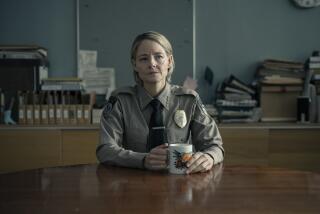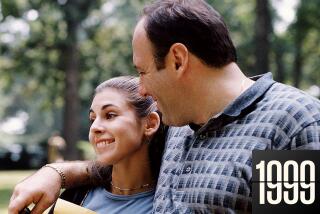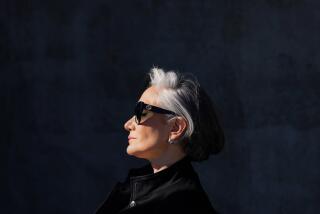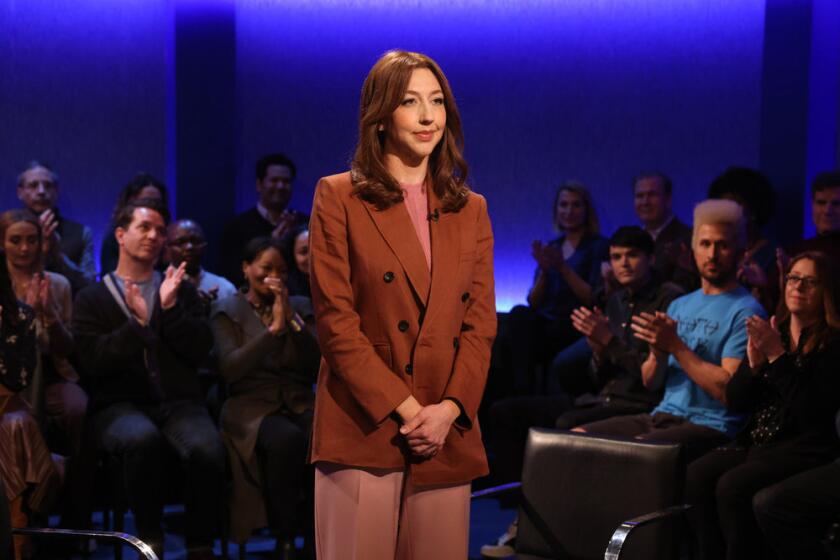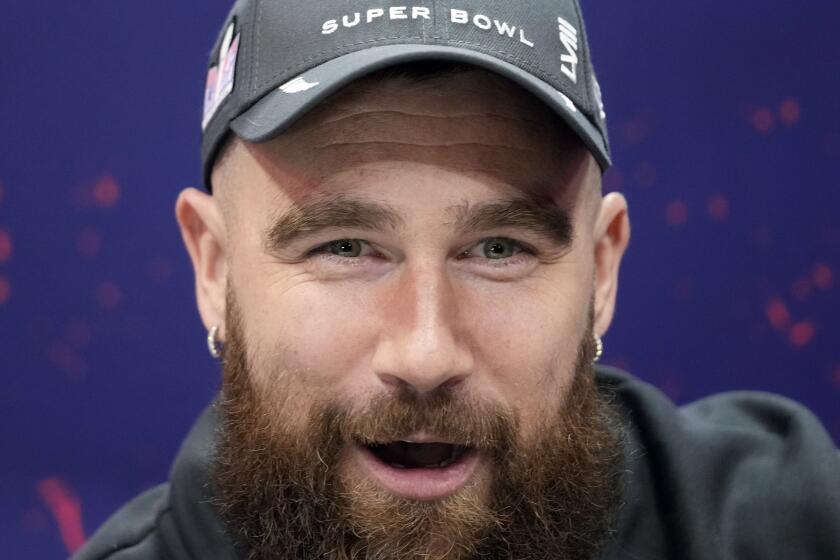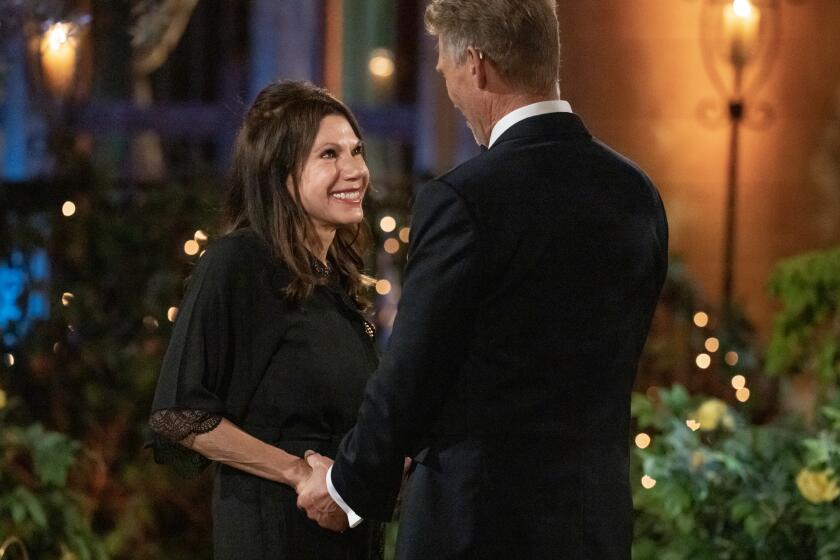From The Archives: Behind the scenes of ‘Twin Peaks’
Back in 1990, the L.A. Times asked “Is TV ready for David Lynch?”
The answer, it turned out, was yes and no. Lynch and collaborator Mark Frost’s serialized murder mystery poking beneath the surface of small-town America was a pop culture phenomenon when it debuted. But by its second season, audiences had cooled to the series and it was canceled on a shocker of a cliffhanger.
But “Twin Peaks” has been credited as the show that opened up TV to all manner of weirdness and eccentricity. And its influence has lasted for 24 years, right up until Monday’s announcement of a revival of the series in a nine-episode limited run on Showtime in 2016.
This story by Steve Weinstein was first published in the L.A. Times on Feb. 18, 1990, just as the series was debuting on ABC.
--------------------------
Out of the early morning fog that lingers on the still waters by the lumber mill, the town’s blonde, teen-age beauty queen, meticulously shrouded in a white plastic tarp, her cherubic face washed deathly white, her full lips drained of color, floats gently ashore -- her youthful sexuality more alluring in death than in life.
So begins “Twin Peaks,” ABC’s bizarre and quirky new nighttime soap opera -- the horrific murder of Laura Palmer unlocking a Pandora’s Box of secrets, mysteries and illicit trysts that eventually touch the lives of nearly all the peculiar inhabitants of this small lumber town nestled in the lush green forests of the Pacific Northwest.
Created by “Blue Velvet’s” David Lynch and his partner, Mark Frost, “Twin Peaks” has already been described by one TV critic as “daringly, perhaps insanely different.” ABC is so concerned about attracting viewers that when it launches the series at an as-yet-unspecified date this spring, it is considering taking a six-figure loss by running the first of its eight episodes without commercials, just to make an event of it.
“Twin Peaks” is certainly like nothing else on television: A serialized murder mystery that is all mood -- one moment the height of campiness, the next disturbingly eerie. A tangled tale of sex, violence, power, junk food and suspicion. One husband, correctly suspecting that his lusty young wife is cheating on him, combs through dozens of squashed butts in her ashtray, finally confronting her when he discovers the remains of cigarette brands different than hers.
“I really like the idea of a continuing story and soap operas,” Lynch, the acclaimed director of such unusual art-house feature films as “Eraserhead,” “The Elephant Man” and “Blue Velvet,” said of his first network television venture. “You can pay more attention to smaller details. ‘Twin Peaks’ has an awful lot to do with coffee, doughnuts and pie.
“Movies have time limits. To really linger over the details of a crust of cherry pie and really get into the saucer and the cup of coffee just as someone is talking about an affair, those are the things you can do in a soap opera. I think there are certain kinds of moods, especially in getting at the mood of a murder mystery, that take time to conjure up.”
“Twin Peaks” seems to be conjured up from the dark recesses of Lynch’s sugar-stimulated mind. An admitted junk-food lover, Lynch conceived many of the scenes for “Blue Velvet” on napkins while high on the glucose rush of Bob’s Big Boy milk shakes and myriad cups of coffee loaded with sugar. Though he restricts himself to a cappuccino in a plastic-foam cup while on the set directing the second episode of the series, his central character--an FBI agent (played by “Blue Velvet’s” Kyle MacLachlan) called in to investigate the murder--raves about a piece of cherry pie he ate at a local diner into a mini-cassette recorder he ostensibly uses to record relevant facts about the case.
MacLachlan believes that one of the show’s strengths is that all the characters in the fictional town “have certain quirks of behavior. Usually, in a film, you’ll have one character who is a little off-kilter and he’s used for comic relief. Here it’s everyone. I think it’s great that the policeman cries at the scene of every crime or that my character talks about trees into the tape recorder as he drives up the mountain. It’s all about these little moments of behavior. It’s like sitting down and just watching people, and I think viewers will love it because we all have that voyeuristic tendency.”
Whether the mainstream television audience will indeed love it is the big question. Many television critics have lavished praise on the two-hour pilot in one sentence and then in the next expressed near-certain belief that the people who prize such shows as “Who’s the Boss?” and “Matlock” will not even give “Twin Peaks” a chance.
Frost, a former writer on “Hill Street Blues” who co-wrote the pilot with Lynch, downplays the idea that this series is too strange for television audiences. He says simply that he and Lynch have tried “to re-imagine the nighttime soap in a way not dissimilar to what ‘Hill Street’ did with the cop show 10 years ago. We’ve kicked up the storytelling a couple of notches in intensity. We’ve tried to bring a hyper-realism to the telling of a very complicated mystery story.”
Frost, who met Lynch several years ago when they were collaborating on a subsequently aborted film project about Marilyn Monroe, insists that the show’s predominant theme--that secrets hold tremendous power over everyone’s lives--is a widely accessible idea. “I spent every summer when I was growing up in a small town, and there were relationships and hidden agendas going back 30, 40, even 50 years. And the level of awareness of other people’s lives was extraordinary. I think that’s been lost a little bit now with urbanization, but in any sort of social group, a small town or a large city, the hidden power that secrets hold over lives is a fascinating part of human behavior.”
ABC has been cautious in putting “Twin Peaks” and two other new adult dramas--”Equal Justice” and “Capital News”--on the air. All three were designated “mid-season replacements” way back last summer as ABC opted not to throw any of them into the competitive frenzy that surrounds the start of the fall season. But even when “Monday Night Football” ended last Christmas, ABC choose to fill those two free hours with movies and hold these series out until spring.
“We waited because dramas are difficult to get off the ground in September, when you have a million new shows all vying for the audience’s attention,” said Stuart Bloomberg, vice president of prime-time programs at ABC. “We’d rather put them on in the spring (after the February ratings sweeps), when they would have a competitive edge against reruns on the other networks.”
Bloomberg concedes that there is a risk in putting something as unusual as “Twin Peaks” on television, but he insists that in the face of eroding network-audience levels, network executives have “got to try to bring something fresh and different to television. It’ll be interesting to see what the audience reaction will be,” Bloomberg said. “On the one hand, it’s a conventional soap opera with all the familiar icons, relationships and intrigue. Yet David Lynch brings not only something that is visually exciting but this strange sense of humor that keeps surprising you as well.
“We do have a lot of questions about accessibility, but if we don’t try, then we’re just filling up the same old cookie cutter again. One of the nice things about this is that it’s a familiar form. It’s sort of like what they did with ‘Moonlighting’--taking a familiar form (the detective show) and turning it on its ear.”
Bloomberg also said that when television gets that rare chance to lure film makers of Lynch’s caliber into the network boat, it would be foolhardy to throw them back. “If we do that, all the interesting shows will end up on cable.”
ABC certainly doesn’t expect “Roseanne”-like ratings for “Twin Peaks,” Bloomberg said, but if the series can lure the same modest but demographically prized audience that kept shows such as “St. Elsewhere” and “thirtysomething” on the air and profitable for years, “that would be terrific.”
On the set in his normal-guy clothes--green shirt buttoned all the way up, green cap, khaki pants and black shoes--Lynch is even more ambitious. He contends that “Twin Peaks” is not weird at all.
“These are pretty straight-ahead characters that I think everyone would love to see. And I would like to say a word to all the beautiful Nielsen families,” he deadpans. “I love them all. I’m making it for them.”
By Lynch’s standards, “Twin Peaks” really isn’t that weird. “Wild at Heart,” his feature film that is due out this summer, sports a creepy torture scene that includes masturbation, two soda bottles and a gun. The murder in “Twin Peaks” does involve drugs, bondage and flesh magazines, but Lynch of necessity stays within the boundaries of television when it comes to explicit violence, nudity and profanity. It does, however, include MacLachlan’s obsessive FBI agent scouring the body of the girl, even probing with tweezers behind her fingernails for clues.
Meeting Lynch in person, it’s hard to finger him as the man behind such unsettling material. He is friendly, sunny, the manifestation of a small-town Boy Scout leader. That dichotomy between the conventional-looking public man and the macabre, hallucinatory stories that spring from his imagination have prompted some to dub him “a sort of psychopathic Norman Rockwell.”
“David is very steady, very personable, and I just love to work with him because he likes to run in the spaces that most people are afraid to run in,” MacLachlan said. “To him, that’s like breathing.”
Lynch’s infiltration of network television came about as a result of what Frost calls their affinity for one another’s work and the determination of their agent, Tony Krantz, to get them to write a TV script. Lynch was reluctant, but three of his film projects were tied up in Dino De Laurentiis’ company’s financial woes, keeping him from making another film for three years following “Blue Velvet.” Frustrated by the delays, Lynch began talking with Frost and, slowly but surely, “Twin Peaks” began to take shape.
“I still never thought it would happen,” Lynch said, “but all of a sudden I found myself really falling into the world of ‘Twin Peaks’ and really loving it.”
Lynch co-wrote the pilot and the next two episodes with Frost and directed the pilot and one subsequent episode. Frost wrote two more on his own and supervised the production of all eight shows. Several film directors, including Tim Hunter (“River’s Edge”) and Caleb Deschanel (“Crusoe”), directed episodes. Besides MacLachlan, the cast includes Jack Nance, Michael Ontkean, Piper Laurie, Joan Chen, Peggy Lipton of “The Mod Squad” and Richard Beymer and Russ Tamblyn of “West Side Story.”
Though he gives detailed comments on the scripts and rough cuts of all the episodes, Lynch said that except for the two shows he actually directed, he is not involved with the series on a day-to-day basis. If “Twin Peaks” is picked up for the fall, Lynch is likely to maintain that same peripheral role, directing an occasional episode when he can fit it into his busy film schedule.
Lynch, who also directed a program called “The Cowboy and the Frenchman” for French television in 1988, said that he had avoided television work because of horror stories he’d heard about network interference. But he said he hasn’t encountered any of that so far. ABC personnel watched dailies and read scripts, but they have not tampered with his ideas or his film making, he said.
Alfred Schneider, vice president of policy and standards at ABC, said that the network had concerns about how Lynch was going to shoot the dead girl’s naked body when it washes ashore, but Lynch decided to wrap the body in plastic and show only her face.
“I watched ‘Blue Velvet,’ and there are obviously things in there that you couldn’t show on television,” Schneider said. “But we went over the ground rules with them at the beginning and we’ve had no problem with anything that they’ve done. There’s nothing in the show that we feel is gratuitous in terms of sex or violence, nothing that is inappropriate for a 10 p.m. show.”
Lynch, who with Frost recently signed with the Fox network to produce a pilot for a documentary-styled series that will chronicle contemporary American events and people, gloated that working with ABC on “Twin Peaks” “has been peachy keen with me. If television is this way, I really like to do television.”
What he especially likes about the TV serial format is that he doesn’t have to rush the stories to a quick conclusion. The murder that opens “Twin Peaks” remains unsolved at the end of the first episode; the mystery thickens through all eight installments and may not even be resolved then.
When it is pointed out to Lynch that television shows almost always catch the bad guy at the end of each episode, that the audience likes its criminals behind bars before they go to bed, that it gives them a sense of “closure,” his soft-spoken patter erupts in disgust.
“Closure. I keep hearing that word. It’s the theater of the absurd. Everybody knows that on television they’ll see the end of the story in the last 15 minutes of the thing. It’s like a drug. To me, that’s the beauty of ‘Twin Peaks.’ We throw in some curve balls. As soon as a show has a sense of closure, it gives you an excuse to forget you’ve seen the damn thing.”
And Lynch isn’t about to give anyone any excuses to forget this.
More to Read
The complete guide to home viewing
Get Screen Gab for everything about the TV shows and streaming movies everyone’s talking about.
You may occasionally receive promotional content from the Los Angeles Times.
